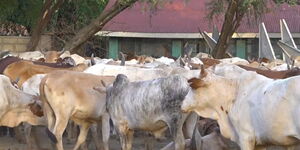Learning institutions in Kenya have been closed since the onset of the Covid-19 pandemic in March 2020.
The Ministry of Education, led by Cabinet Secretary George Magoha, made international headlines after announcing the cancellation of the school year and suspension of national exams. As it stands, students are expected back in school in January 2021.
Magoha has since announced that schools could re-open earlier if the pandemic curve was flattened.
Amidst the confusion and bickering, however, children as young as eight years old are falling into drug abuse.
A visit to Kibra Constituency, Nairobi by Kenyans.co.ke on Wednesday, September 9, revealed a worrying situation.
For many children from low-income backgrounds, online learning couldn't be further from reality.
A worrying number of students in primary and secondary school frequent drug dens, and some have ventured into selling drugs including marijuana and khat among others.
A conversation with Pinchez*, who runs a miraa place, shed more light on the situation.
His popular establishment is almost always full, with patrons ranging from the very young to the middle-aged.
Other than selling miraa, which is legal, he sells several other drugs under the radar, including marijuana and a cocktail of tablets.
Pinchez * confirmed that under-age children had been some of his biggest customers during the Covid-19 period.
Seated on wooden benches and with music blasting, going to such places has become something to do for many students.
Others, engaged in legitimate income-generating activities after schools closed, frequent the joints to relax after long days.
Some of the most preferred hustles include boda boda riding and food-related businesses, such as selling coffee and fast foods.
Others have, unfortunately, turned to criminal activities while at home including petty theft.
Several school-going children have also ventured into selling drugs, mostly marijuana, during the Covid-19 period.
Peer pressure is a factor, with the students often moving in large groups.
Pinchez* stated that he welcomed the children without asking for identification, describing it as a common practice in the area.
He noted that they had grown accustomed to paying police officers regular fees to facilitate their smooth operations.
He observed, however, revealed that he had never been questioned for serving under-age children.
Nairobi Police Boss Rashid Yakub was yet to respond to queries from Kenyans.co.ke by the time of publication.
The situation is a source of worry for many parents.
It is compounded by the confusion that has characterised the school calendar, with students and parents both still unsure of when learning will resume.
Listen to the conversation with Pinchez* below:
{"preview_thumbnail":"/files/styles/video_embed_wysiwyg_preview/public/video_thumbnails/VX9z9MY_AmM.jpg?itok=EKf3FxAb","video_url":"","settings":{"responsive":1,"width":"854","height":"480","autoplay":0},"settings_summary":["Embedded Video (Responsive)."]}












